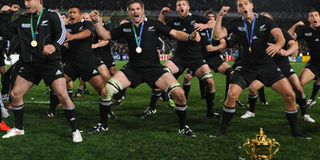The inconvenient truth that threatens All Blacks World Cup

New Zealand All Blacks including captain Richie McCaw (C) perform a victory Haka after they won the 2011 Rugby World Cup final match against France at Eden Park Stadium in Auckland. FILE PHOTO
Statistics can tell us many things, and be interpreted in different ways, especially in the always-emotive context of international sport, but, over time, clear patterns do emerge, and solid conclusions can be drawn. That being the case, the biggest threat to the All Blacks at the upcoming Rugby World Cup could well be themselves. Or their discipline, to be exact.
There was a school of thought, outside of New Zealand of course, that for a time viewed the All Blacks as a protected species. That the clear and obvious mistake that contributed to New Zealand’s earliest exit from a Rugby World Cup in 2007 had spooked officialdom, leading to a level of on-field leniency in the aftermath that was perhaps absent for other teams.
A stretch? Perhaps, but the disciplinary statistics through the last three four-year Rugby World Cup cycles are revealing.
New Zealanders were angered after the forward pass in the lead-up to France’s match-winning try during the All Blacks’ shock loss in the 2007 quarter-final. The match referee Wayne Barnes became public enemy No 1 in New Zealand, and still hasn’t been forgiven by some Kiwis.
The Englishman was the object of such fury, he later admitted it had taken its toll both personally, but also on family and friends. Barnes was backed at the time by the then World Rugby referees boss, New Zealand’s Paddy O’Brien, and this year officiates at his fourth Rugby World Cup.
Even so, did the ripple effects of the controversy affect the referees in general, in terms of how they officiated on All Blacks games? Statistically, there was undoubtedly a shift. In the 37 Tests the All Blacks played between 2005 and 2007, the side was on the receiving end of 12 yellow cards, at an average of one for every 246 minutes of play. Opponents suffered eight yellows, at one every 370 minutes.
This reversed dramatically following the controversial quarter-final. Between 2008 and 2011, in 55 Tests, the All Blacks were sanctioned with just 13 yellow cards. This equated to one for every 338 minutes, in effect giving the All Blacks an additional one and a quarter games of playing time between each sanction.
Meanwhile their opponents were suddenly getting hit much harder, suffering 22 yellows, and two reds, for the same period – with a mean of 183 minutes per sanction, a drop of nearly 200 minutes of playing time. Were the All Blacks simply way more disciplined, their opponents way less? Or were referees slightly intimidated, after the backlash their popular colleague had endured? They are only human after all.
The statistics for the four years on their own might have suggested the All Blacks had become “clean skins”, but they were, and still are, applying the same defensive tactics they always have, when slowing opposition momentum. The moment a threat arises, the All Blacks will generally kill quick ball at the breakdown, prepared to concede the penalty in the knowledge that giving up three points is better than seven.
Often, they have the advantage by more than three, and usually more than seven, so the foul can be committed knowing their opponents may not kick for goal anyway. If the All Blacks are behind, infringements within goal-kicking range are understandably less prevalent.
They have recently been slammed again by critics as cynical, but the tactics are certainly legitimate. They have also been successful, but they will carry a large risk in a tournament of tight margins, as this World Cup promises to be.
The numbers show that the All Blacks are no longer getting the liberties that they did in the immediate aftermath of the 2007 controversy, especially around the breakdown where a large percentage of their infractions have occurred. Between 2012 and 2015, there were 23 All Black yellow card sanctions from 45 Tests, with the average lowering dramatically to one for every 156 minutes, a drop of over two full Tests of playing time per sanction from the four years after 2007.
Similarly, as the statistics painted a picture of a more ill-disciplined All Blacks, their opponents were suddenly less so again. Through the same time frame, teams playing New Zealand suffered just 17 yellow cards, at one for every 200 minutes of play, an additional 17 minutes of playing time per sanction. This remarkable reversal completely undid the trend that had emerged following the 2007 World Cup.
The seemingly different refereeing approaches during the two sample periods could be considered as coincidental, but the odds on that do lessen given the 2012-15 pattern has largely played out again between the start of 2016 and now. Since the last World Cup, the All Blacks have received 21 sanctions from 47 Tests, at an average of one for every 179 minutes played, while opponents have received 12, at 313 minutes per card.
Significantly, after not having had a player ordered from the field since 1967, New Zealand have had two red cards in the last three years and lost both Tests as a result.
An inconvenient truth it might be, but the numbers are indisputable and the pattern clear. The All Blacks were so far ahead of the rest at the last World Cup, five yellow cards in seven games didn’t cost them. It is doubtful the class of 2019 will be able to get away with that many.




